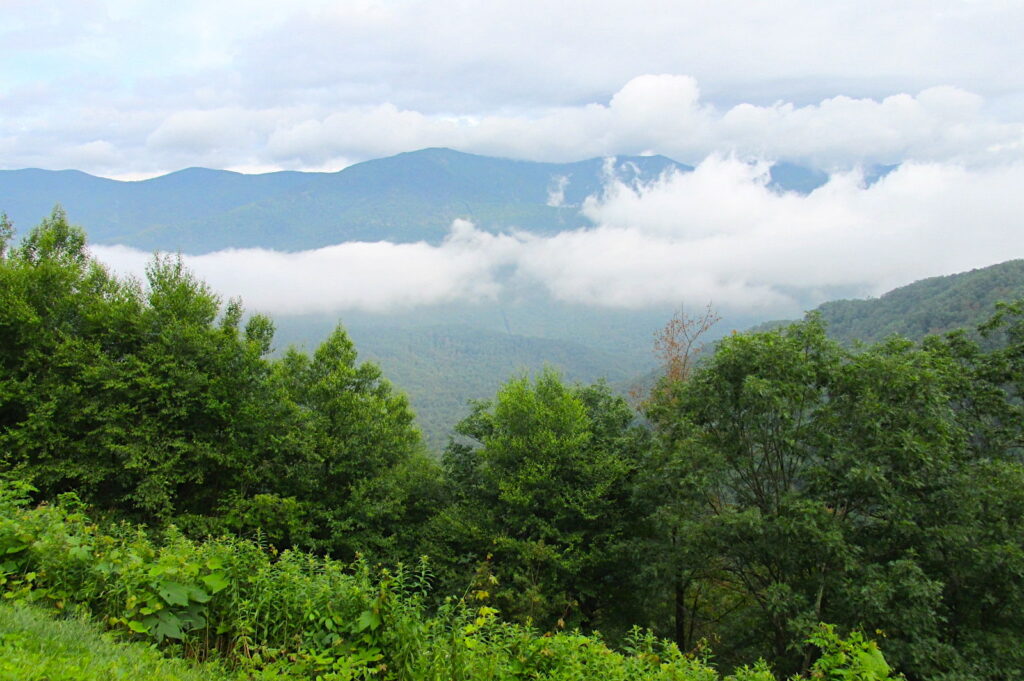Great Smoky Mountain National Park
North Carolina
May 2013
Did I mention the ginseng? Aha!
One night we stay at campsite #65 on Noland Creek in the Great Smoky Mountains. #65 is quite broad, large enough for six different groups of campers. Two guys, tall and lean, dressed in blue jeans, white cotton T-shirts and open-front flannel shirts are camping over there. This site is less than a mile from the road, which explains how they were able to lug in so much luxury gear with them: lounge chairs, two-burner gas stove, fishing tackle, big canvas tent. They do not look like backpackers.
A forest ranger strolls into the site and visits with them. They hunker there creekside for a spell (that’s how they say it here in the South.) I can’t hear them but they seem to have quite a bit to talk about. They’re having a good ole time, yes they are, laughing and tossing stones into the creek. Without shaking hands, they say their goodbyes and the ranger comes over to check in with our group.
After a few opening amenities, I wonder out loud how long he’s known these guys. “Oh, for some time now,” he says.
“Yeah? What’s their story?” I ask.
“I’ve been keepin’ my eye on ‘em ‘bout eighteen months now. They’re takin’ ginseng out the forest.”
“So?”
“It’s against the rules and regs ‘round here. You may not remove any plant from the forest, especially ginseng. It’s protected.”
“Why don’t you arrest them?”
“Cain’t.”
“Why not? I notice you’ve got a firearm strapped to yourself there. Should make it a little easier, y’know, gives you some authority.”
“I cain’t arrest ‘em ‘cause I ain’t seen ‘em take it. For a year and a half, they been stayin’ a step or two ahead o’ me and I just cain’t catch ‘em in the act. Cain’t figure out what they’re doing with it neither, ‘cause I ain’t been able to find it on ‘em. These guys are good.”
“What’s ginseng look like?”
“Aww, I cain’t tell you that. We don’t want too many people after that stuff.” He chuckles as he says this.
“Well, okay. Bye.”
“Yep. Bye.”
Ginseng. I wish I had a photo to show you but I’m not allowed to know what it looks like. But imagine horseradish. Looks a lot like it.
Why would these elusive scoundrels be poaching ginseng? Simple. It is reputed to be slightly magical, or at least it supposedly does amazing things. And therefore, it’s valuable.
In the ancient Manchurian mountains, ginseng was a symbol of divine harmony. There was some panache associated with its shape, that of the legs of a man. In fact, “Ginseng” translates to the Chinese term rénshen which literally means “man root.” Not that kind of man root, you pervert, but it refers to his legs. The herb consists of a light-colored, forked-shaped root, a relatively long stalk and green leaves in sort of an oval shape.
In addition to its spiritual man root significance, the health benefits of this herb were first documented during China’s Liang Dynasty, back when you only needed three digits to identify the year.
White people discovered ginseng in America in 1716, but the Cherokee had been using it back to ancient times. In their hands ginseng was used as a healing potion.
There has always been a demand for ginseng in China, more than they have been able to grow. In the 1970s, North America responded to the shortage by exporting pantloads of ginseng to China, so much of it that we nearly depleted our own supply and it became endangered. This is when the appropriate word for collecting ginseng changed from harvesting to poaching. Our ginseng was very popular in China as the two varieties, American and Asian, were almost identical.
Ginseng has and is reputed to be a panacea. The Greek name for ginseng is Panax which translates into “all-heal.” So…
Chinese rénshen = man root
Greek Panax = all-heal
What can this man root heal? I will not swear by it, but supposedly ginseng boosts energy, lowers blood sugar and cholesterol levels, reduces stress and helps you relax. It has rejuvenating powers: This is the man-root part — yes this time, that man root. Also, it may improve concentration and learning ability, it may improve your mood. It could ease menopausal symptoms and help you fight cancer, heart disease, fatigue, hepatitis C and a number of respiratory problems. Sounds like chicken soup. Available right here in the Great Smokies.

